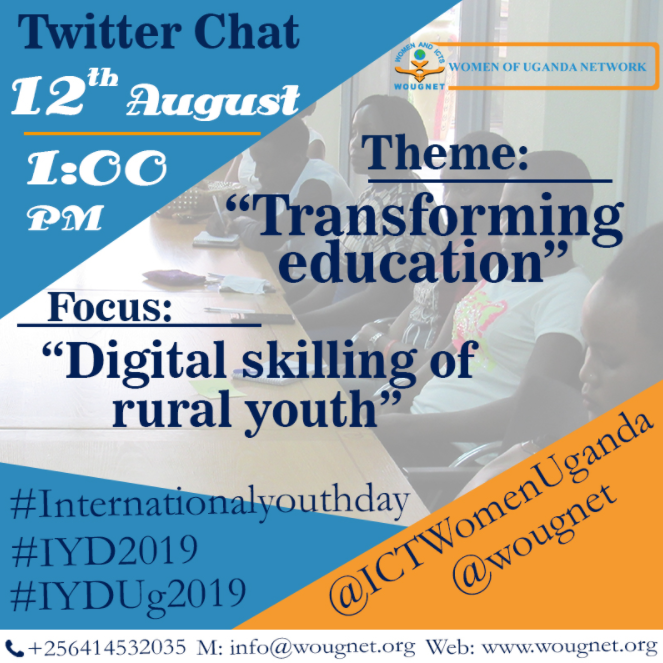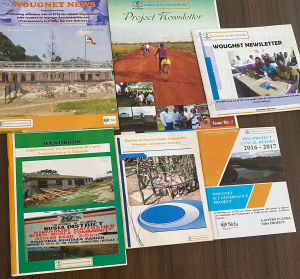TOPIC: Youth, Women, ICT. Internet, RCDF
The 12th of August was selected as the commemoration day for youth by the United Nations through a resolution passed in 1999. Commemorated annually since the year 2000, it is a day that has been set aside to highlight various issues that affect the youth globally. Since its first commemoration in 2000, the day has attracted worldwide attention. It has brought to light some serious issues for governments and other development players to pay attention to while aligning their proposed initiatives to global, regional and national development agendas; policy formulation, consultation, and implementation processes, among others, but especially the current and future needs of youth
Capturing goal 4 of the United Nations’ Agenda 2030 for Sustainable Development, this year’s global theme was “Transforming education”. According to the UN Department of Economic and social affairs for youth, the theme was designed to examine how governments among other stakeholders have transformed education hence contributing to achieving the agenda 2030 among other development agendas. Globally, the day attracts a series of pre and post-events, with the actual commemoration date taking the largest chunk of activities that highlight youth issues in alignment with the global theme.
Countries across the world tend to align their national themes to the global one or even at times choose to use the same. This year Uganda’s national theme in commemoration of the day was “Transforming Education for responsible citizenship and employment creation”. Uganda has one of the youngest populations worldwide coupled with an unemployment rate of 2.59% according to 2018 estimates by ILO. The levels of unemployment continue to rise despite an increase in entrepreneurship training offered by the government and other stakeholders. Rural youth are at an even greater advantage as major economic earners like agriculture are becoming less popular due to various reasons including; poor farming methods, land fragmentation & ownership, and climate change among others.
One identifiable gap amidst all these challenges is the lack of digital skills. Coupled with various interventions, digital skilling could be the solution to addressing these challenges and present more opportunities and career options for rural youth.
In a Twittersisi ufungua chat held on 12th August, WOUGNET sought to highlight the importance of digital skilling rural youth as a percentage of the large young Ugandan population that faces unique challenges compared to their urban counterparts and youth from more developed parts of the world.
Some of the highlights from this discussion arose from responses on questions around government education programs, online participation and policy initiatives to connect rural Uganda, in particular, the Rural Communications Development Fund (RCDF).
In response to whether rural youth are likely to be competent with the introduction of education programs like UPE and USE – @Karlvoo responded – “The rural youth would definitely be competent but to a very small extent not as competent as the urban youth, the gov’t and other stakeholders need to first address the big digital gap between the rural and urban areas @MoICT_Ug @UCC_Official #InternationalYouthDay2019” As to whether the RCDF has been effective in addressing issues of access to the internet for rural youth and citizens at large – @hatimsusan responded – “The gov’t of Ug thru @UCC_Official, set up the RCDF in 2009, so far & to the best of my knowledge most govt offices in most of rural Uganda have been connected to the internet thru the extension of the national broadband infrastructure project …… Not that I can say, except for the programs to connect teaching colleges in select rural towns – there is no evidence to indicate that the rest of the rural youth population have benefited from this @NITAUganda1 @UCC_Official @MoICT_Ug @moes_ug #IYD2019 #IYDUg2019” On how one would relate digital skilling to online participation or freedom of expression – @princesaito responded – “Digital skilling helps give an individual courage and strength to do something freely and easily – without digital skill some of us wouldn’t be where we are today but because we know what we know digitally we can stand and speak. @UCC_Official @MoICT_Ug @NITAUganda1 #IYD2019”
Key priority areas recommended from this conversation for government to take into consideration if rural youth are to benefit from the opportunities ICTs and the internet have offered revolved around improving education quality and developing more inclusive ICT access/connectivity policies. Some recommendations made include; More access to digital platforms in rural areas and more effective digital training conducted for youth; Ministry of education needs to introduce and improve on already existing ICT related subjects at primary and secondary school; Offer digital training for all youth who are in and out of school at new and existing community centers at no cost; URA and the Ministry of finance needs to Get rid of tax on ICT tools and internet data; and UCC needs to provide for digital skilling initiatives for youth as key in the next RCDF (if any) and national development agendas. This conversation continued on the WOUGNET and ICT4DY facebook pages.
While there are still countless issues the youth of the world continue to face, education and particularly the education of rural youth in Sub-Saharan Africa should be one of the solutions to addressing these challenges. Even more importantly, digital skilling must be made a critical part of education and any other youth development initiatives if we are reaping the benefits that ICTs have to offer and ultimately to progress as a nation and a continent.
Article by
H. Susan Atim
Women of Uganda Network (WOUGNET)






